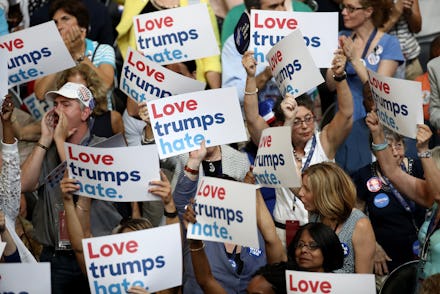2016 DNC Started Out With a Night of Love and Racial Justice, Unlike the Racist 2016 RNC

A four-letter word dominated last night's Democratic National Convention telecast. Luckily, it's one you can say in polite company: love.
Speaking to a sea of attendees holding signs that read, "Love trumps hate," speaker after speaker emphasized a progressive Democratic platform that was built on the idea of love. "But you cannot love your country without loving your countrymen," New Jersey Sen. Cory Booker proclaimed. "We're called to be a nation of love."
Booker drew a clear distinction in his speech between mere tolerance and the practice of love, as well:
Tolerance says, "I am going to stomach your right to be different. If you'd disappear from the face of the Earth I am no better or worse." But love, love knows that every American has worth and value. So no matter what your background, and no matter what their race or religion or sexual orientation, love, love recognizes we need to each other; that we as a nation are better together. Divided we are weak. When we are united, we are strong; when we are indivisible, we are invincible. This, this — this is the understanding of love.
It's not every day that politicians use love in their political platforms. People don't always expect their politicians to love the people they serve. But this emphasis on love in both Booker's speech and the party's platform, whether or not it was intentional, referenced the kind of love that serves as the bedrock of racial justice.
In her 1994 essay "Love as the Practice of Freedom," author and feminist activist bell hooks bemoaned "no powerful discourse on love emerging either from politically progressive radicals or from the left." However, 22 years later, hooks' call for love to take its place in politics was fulfilled in the first day of the convention.
"Without love, our efforts to liberate ourselves and our world community from oppression and exploitation are doomed," hooks wrote in the same essay. "Without an ethic of love shaping the direction of our political vision and our radical aspirations, we are often seduced, in one way or the other, into continued allegiance to systems of domination — imperialism, sexism, racism, classism."
The Democratic Party platform officially adopted Monday night promises to fight each of those systems of domination hooks calls out. Among the many bullet points in the document are: "Raise Incomes and Restore Economic Security for the Middle Class," "Fight for Economic Fairness and Against Inequality," "Ending Systemic Racism," "Closing the Racial Wealth Gap," "Reforming Our Criminal Justice System" and "Fixing Our Broken Immigration System."
In a deep contrast, speakers spouting rhetoric emphasizing division, fear and racial tension dominated the first night of the Republican National Convention, which began on July 18 in Cleveland. As Mic previously reported, the RNC's proceedings showed the "GOP has reached the point where its values and virulent, nativist bigotry are officially indistinguishable from one another. Welcome to the Republican Party of 2016."
During the RNC, Republicans attacked the Black Lives Matter movement, and the room cheered when one of the officers involved in the death of Freddie Gray was cleared of all charges. Speakers played into attendees' fears and misgivings about 2016 America, rather than promising to liberate them from it.
"The vast majority of Americans today do not feel safe," former New York City Mayor Rudy Giuliani said during his RNC speech. "They fear for their children. They fear for themselves. They fear for our police officers who are being targeted."
DNC speakers, instead, spoke not only about love, but emphasized a much wider definition of what it means to be American, a new vision for who we talk about when we talk about an American community. Several Latino speakers — undocumented, formerly undocumented and citizens — spoke about the need for immigration reform.
"Immigrants contribute to our communities," Rep. Luis Gutiérrez said Monday night. "Immigrants die defending our democracy. And you know what? They give our founding principles meaning in our time. Every time immigrants are labeled as 'them.' But over time, they become part of 'us' — 'We, the people.'"
Gutiérrez's call for solidarity is another form of the love that hooks emphasized. And in the Latin-American theology known as "mujerista theology," a feminist theology that emphasizes the voices and struggles of Latina women in the fight for justice, solidarity and love are one and the same.
In her 1996 essay "Solidarity: Love of Neighbor in the 21st Century," mujerista theologian Ada María Isasi-Díaz defined solidarity as "the union of kindred persons 'arising from the common responsibilities and interests, as between classes, peoples or groups; community of interests, feelings, purposes or action; social cohesion.'"
Isasi-Díaz called for solidarity with those who are "poor and oppressed," "the ones who are exploited" and people who suffer from racism, ethnic prejudice and classism.
When Sen. Elizabeth Warren closed her speech, she emphasized a need for that unity, as well.
"If you believe that America must work for all of us, not just for the rich and powerful; if you believe we must reject the politics of fear and division; if you believe that we are stronger together, then let's work our hearts out to make Hillary Clinton the next president of the United States," she said.
In his closing words at the RNC on Thursday, Trump abandoned hope and threatened the American people.
"I have a message to every last person threatening the peace on our streets and the safety of our police," he said to those watching. "When I take the oath of office next year, I will restore law and order [in] our country."
The RNC espoused a theory of two Americas: one that needs protection and one that must be brought to heel. The DNC emphasized one struggling America: one that must be lifted up through the power of love.